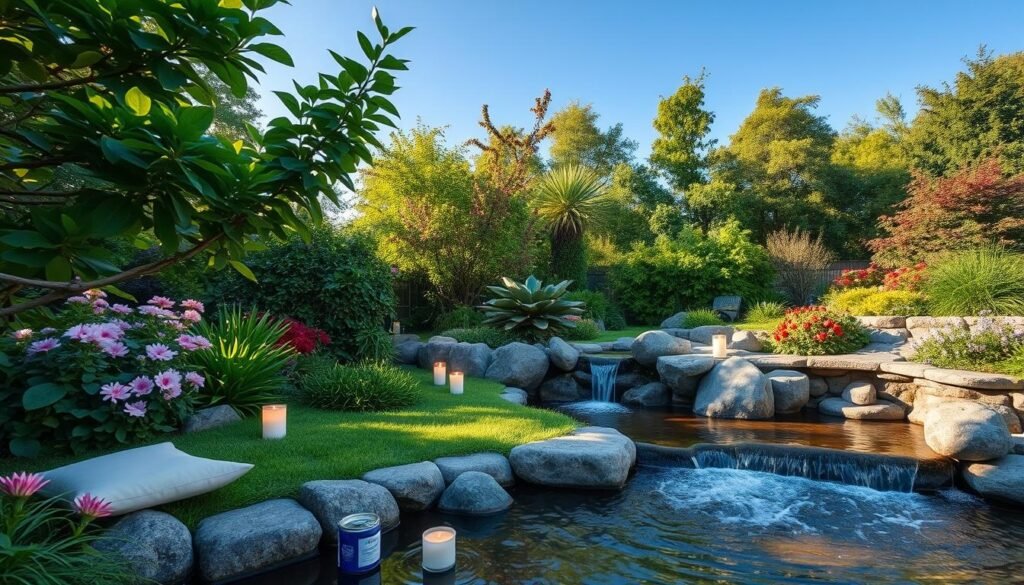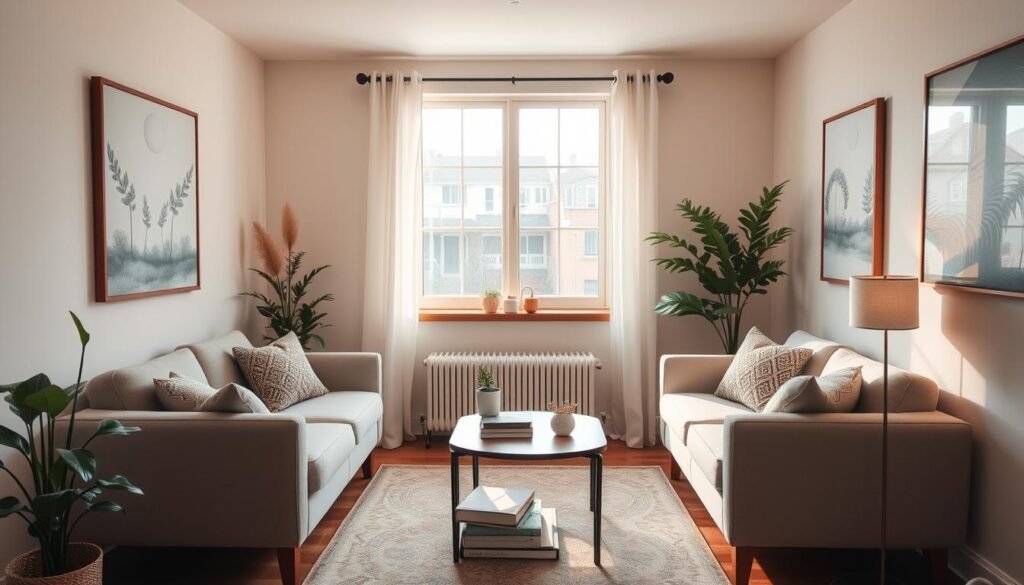We often struggle to relax our minds, leading to stress and anxiety. This can be caused by low dopamine, an overactive emotional brain, or a stuck nervous system. It’s key to understand the value of stress relief and calming techniques for our mental health.
Many of us are looking for ways to relax and find peace. About 77% of Americans experience stress symptoms like headaches or fatigue. Up to 90% of doctor visits are linked to stress. This shows we need effective ways to manage stress and relax our minds.
Fortunately, there are many ways to relax, like meditation, deep breathing, and progressive muscle relaxation. Mindfulness meditation can lower anxiety by about 30%. Regular practice can also reduce negative feelings. By adding these techniques to our daily lives, we can improve our mental relaxation and well-being.
Why Is My Brain Not Relaxing?
ToggleKey Takeaways
- Stress and anxiety can severely affect our mental and physical health. It’s vital to practice stress relief and calming techniques.
- Mindfulness meditation can reduce anxiety and improve mental relaxation. About 33% of Americans use meditation for wellness.
- Deep breathing and progressive muscle relaxation can lower stress levels and enhance well-being.
- Regular use of relaxation techniques can decrease pain perception and improve mental health symptoms.
- Being in nature and spending time in green spaces can ease worry, anger, and fear. It improves social connection and focus.
- Journaling and self-reflection can help ease emotional burden and increase thought clarity. They contribute to better mental well-being.
Understanding Why Our Minds Won't Relax
Trying to relax our minds is key. Our busy lives, with too much digital stuff, not enough sleep, and bad diets, play a big part. To calm down, we need to know what’s making our minds race.
It’s hard to relax because of many reasons. Too much media, like scary news, can make us anxious. Also, our emotional brains can be too active, making us feel anxious and depressed. This makes us try to stay busy to avoid bad thoughts.
Modern Lifestyle Factors
Our daily habits and surroundings affect how relaxed we can be. Chronic stress makes our nervous system too active, making us feel anxious. PTSD can make this even worse, making it hard to relax.
Digital Overstimulation
Digital overload is another big problem. Social media, news, and online stuff can overwhelm us. This makes it tough to relax and find peace.
Biological Stress Response
Our body’s stress response, like fight-or-flight, also affects relaxation. By knowing these issues and using calming methods, like breathing and exercise, we can tackle our mental restlessness. This helps us find peace.

Join 30,000+ subscribers for exclusive access to our Relaxing tips!
The Science Behind Mental Restlessness
Understanding mental restlessness is key to finding peace and calm. Studies show that stress, anxiety, and depression can activate our fight-or-flight response. This can cause us to feel restless, pace, and experience tension.
To calm our minds, we need to use calming techniques like meditation and deep breathing. These relaxation exercises can lessen anxiety and depression. They help us feel calm and happy. Also, taking breaks and enjoying leisure activities can reduce mental restlessness.
Some interesting facts about mental restlessness include:
- 70% of people feel guilty when they try to relax.
- 80% of adults feel overwhelmed by their busy lives.
- 50% of parents think their kids are stressed from too much structure in their free time.
By learning about mental restlessness and using calming techniques and relaxation exercises, we can handle stress better. This helps us find mental relaxation in our daily lives.
| Condition | Symptoms |
|---|---|
| Depression and anxiety | Pacing, constant leg movements, feelings of tension or discomfort |
| Bipolar disorder | Impulsive behavior, suicidal thoughts |
| ADHD | Inability to sit or stand, feeling restless |
We often struggle to find mental calmness because of various triggers. Understanding these can help us find ways to relax. Things like noise and clutter can really affect our ability to unwind and practice mindfulness.
Psychological stressors like anxiety and depression also make it hard to relax. Practicing relaxation techniques, such as deep breathing and meditation, can help. Physical issues, like not enough sleep and bad diet, can also mess with our mental peace.
To beat these triggers, we can start healthy habits. Regular exercise and a balanced diet can help reduce stress and bring calmness. By knowing these triggers and managing them, we can make a better space for relaxation and mindfulness. This leads to a more peaceful mind.
We can find mental calmness through different relaxation techniques. These include mindfulness exercises and stress relief methods. They help us achieve a peaceful mind, which is key for our well-being.
Some effective methods are deep breathing, aerobic exercise, and spending time in nature. These activities can greatly benefit us.
Relaxation techniques offer many advantages. They can lower stress symptoms and improve our quality of life. Regular practice also helps control blood sugar levels and heart rate. It can even improve digestion and ease muscle tension and chronic pain.
For example, progressive muscle relaxation involves tensing and relaxing muscles. Visualization techniques use our senses to enhance relaxation. For instance:
- Deep breathing exercises
- Yoga and tai chi
- Mindfulness meditation
By adding these techniques to our daily routine, we can boost our mental calmness and health. Remember, relaxation is a skill that grows with practice. It’s important to find the methods that suit us best.
The Impact of Daily Habits on Mental Relaxation
Our daily habits greatly affect our mental relaxation. Sleep, exercise, and diet are key factors. Healthy habits lay the groundwork for relaxation and lower stress. Regular routines help us cope with stress, like during the COVID-19 pandemic.
Keeping a regular sleep schedule, exercising often, and eating well are vital for calmness. A study shows that too many decisions can stress us out. So, simplifying our choices and setting time for relaxation can bring peace.
Effective relaxation techniques include:
- Deep breathing exercises
- Progressive muscle relaxation
- Meditation and visualization
- Engaging in outdoor activities, such as walking or outdoor play
These methods can ease chronic stress symptoms like anxiety and depression. Adding them to our daily life improves our mental health and brings peace.
Keeping a daily log can also help us spot time-wasting habits. By focusing on relaxation, we gain heart health, stress reduction, and better brain function. Simple changes in our routine can lead to a calmer mind and a better life.
| Relaxation Technique | Benefits |
|---|---|
| Deep Breathing Exercises | Reduces stress and anxiety, improves sleep quality |
| Progressive Muscle Relaxation | Alleviates symptoms of chronic pain, improves mood |
| Meditation and Visualization | Enhances cognitive function, reduces symptoms of depression |
Comparing Different Relaxation Methods
We’ve talked about what affects our mental calmness and looked at various relaxation techniques. Now, let’s see how these methods stack up in achieving a peaceful mind.
Popular techniques include mindfulness exercises, deep breathing, and progressive muscle relaxation. These have been proven to lower stress and anxiety. They help us feel more calm and well.
Here are some benefits of different relaxation methods:
- Progressive muscle relaxation: reduces cortisol levels, an indicator of stress
- Deep breathing: lowers anxiety and stress levels
- Mindfulness exercises: increases self-compassion and reduces rumination
- Yoga: connects with lower cortisol levels and increased relaxation
Using these techniques can create a cycle of better relaxation and less stress. By making them part of our daily life, we can find peace and improve our mental calmness.
Keep in mind, everyone is different. What works for one might not work for another. It’s important to try out different methods to find what suits you best.
| Relaxation Method | Benefits |
|---|---|
| Progressive Muscle Relaxation | Reduces cortisol levels, lowers anxiety |
| Deep Breathing | Lowers anxiety and stress levels, promotes relaxation |
| Mindfulness Exercises | Increases self-compassion, reduces rumination, promotes mental calmness |

Join 30,000+ subscribers for exclusive access to our Relaxing tips!
Mindfulness vs Traditional Meditation
Two popular ways to calm the mind and reduce stress are mindfulness techniques and traditional meditation. Both are effective in promoting mental calmness. We’ll look at the benefits of each, helping you pick the best one for you.
Benefits of Mindfulness
Mindfulness means being in the moment, noticing thoughts and feelings without judgment. It can calm the mind and lower stress. Some key benefits include:
- Reduced symptoms of anxiety and depression
- Improved emotional regulation
- Enhanced self-awareness
Traditional Meditation Approaches
Traditional meditation focuses on a specific object, like the breath, to find calm. It can calm the mind and reduce stress. Some benefits are:
- Reduced stress and anxiety
- Improved sleep quality
- Increased feelings of relaxation and calmness
Adding relaxation strategies like mindfulness and meditation to your day can calm your mind. Choose what works for you and make it a regular part of your relaxation strategies.
Physical Activities for Mental Calmness
Many of us don’t realize how much physical activities help our mental health. Studies show that regular exercise can greatly improve our mental calmness. Relaxation techniques like yoga and tai chi are very good at making us feel calm and less stressed.
Doing physical activities helps us find ways to deal with stress and boosts our mental health. For instance, aerobic exercise can calm our minds and lessen anxiety and depression. Adding physical activities to our daily lives can lead to a peaceful mind and better mental health.
Some great physical activities for mental calmness include:
- Yoga: combines physical movement with mindfulness exercises to promote relaxation and reduce stress
- Tai chi: a low-impact exercise that combines movement with deep breathing and relaxation techniques
- Walking: a simple yet effective way to reduce stress and improve mental calmness
By adding these physical activities to our daily routine, we can enjoy the benefits of relaxation techniques and better mental health. Start slow and pick activities you like. This makes it easier to keep up and helps you find a peaceful mind.
| Physical Activity | Benefits |
|---|---|
| Yoga | Reduces stress and anxiety, improves flexibility and balance |
| Tai chi | Improves balance and coordination, reduces stress and anxiety |
| Walking | Improves mood, reduces stress and anxiety, improves overall health |
The Role of Environment in Mental Peace
Our environment greatly affects our mental peace. Things like lighting, color, and noise matter a lot. To make our space peaceful, we can try relaxation techniques and mindfulness exercises.
Being in nature is also key for a calm mind. Studies show that nature helps our brains work better. We can bring nature into our lives by taking short breaks to listen to sounds of nature or by looking at green spaces.

- Using aromatherapy with lavender to improve mood and lessen anxiety
- Incorporating basic warm touch to release oxytocin, a soothing hormone
- Implementing calming spaces at work to reduce stress and improve mental health
By adding these strategies to our daily lives, we can find more mental calmness. A calm environment is vital for our mental health. Using relaxation techniques, mindfulness exercises, and stress relief methods can help us achieve that.
| Environment Factor | Impact on Mental Peace |
|---|---|
| Nature Exposure | Improves working memory, cognitive flexibility, and attentional control |
| Aromatherapy | Improves mood, lessens anxiety, and deepens sleep |
| Calming Spaces | Reduces stress, improves mental health, and promotes relaxation |
Digital Detox Strategies for Mental Relief
We often get caught up in endless notifications, social media, and emails. This can make our minds race and stop us from feeling calm. Taking a digital detox can help us feel less stressed and more relaxed. By putting down our devices, we can quiet our minds and find peace.
Benefits of a digital detox include better focus, more productivity, and less stress. To start a digital detox, try setting aside time each day without your devices. You can also use apps to track and limit your screen time.
Here are some tips for a successful digital detox:
- Set realistic goals for device-free time
- Find alternative activities to replace screen time, such as reading or exercise
- Use technology to our advantage, such as apps that track screen time and limit social media access
By making digital detox a part of our daily life, we can use our devices less. This helps us relax and find a peaceful mind. Remember, taking breaks from our devices is key for our mental health and well-being.
| Benefits of Digital Detox | Results |
|---|---|
| Improved focus | 78% of participants reported improved focus |
| Increased productivity | 65% of participants reported increased productivity |
| Enhanced mental relief | 60% of participants reported reduced stress levels |
Natural Remedies and Supplements for Relaxation
Exploring ways to find peace, natural remedies and supplements are key. They offer calming techniques and stress relief methods. We’ll look at herbal solutions, essential oils, and dietary supplements for a peaceful mind.
Some of the key natural remedies include:
- Herbal supplements like chamomile and valerian root
- Essential oils such as lavender and lemon balm
- Dietary supplements like GABA and omega-3 fatty acids
Herbal Solutions
Herbal solutions have been used for centuries to help relax and reduce stress. Herbs like passion flower and kava are known for their calming effects. But, it’s important to know about possible side effects and interactions with other medicines.
Essential Oils
Essential oils can help in aromatherapy for relaxation. Oils like lavender and chamomile can lower anxiety and improve sleep. But, it’s important to use them safely and with a healthcare professional’s guidance.
Dietary Supplements
Dietary supplements like omega-3 fatty acids and GABA can help relax and reduce stress. They support brain health and lower anxiety levels. This can help achieve a peaceful mind.
Professional Help and When to Seek It
We know that while relaxation techniques and self-care can help, sometimes we need professional help. It’s key to know when we should seek support for our mental health. This ensures we stay on the path to good mental health.
Techniques like deep breathing, meditation, and yoga can lessen stress and boost well-being. Yet, for those dealing with anxiety and depression, professional help is often needed. A mental health expert can offer tailored advice and help in finding peace of mind.
Some benefits of getting professional help include:
- Personalized guidance on relaxation techniques and stress relief methods
- Support in developing a peaceful mind and improving mental health
- Access to resources and tools for managing stress and anxiety
Remember, asking for help is a sign of strength, not weakness. By doing so, we take a big step towards better mental health and a more fulfilling life.

The Centers for Disease Control and Prevention (CDC) say that regular exercise and relaxation can cut down stress and boost mental health. Combining these with professional advice can lead to effective stress management and a peaceful state of mind.
| Relaxation Technique | Benefits |
|---|---|
| Deep Breathing | Reduces stress symptoms, improves focus and mood |
| Meditation | Improves mental health, reduces anxiety and depression |
| Yoga | Improves flexibility, reduces stress symptoms, improves overall well-being |
Building Long-term Relaxation Habits
Developing relaxation habits is key to keeping our minds calm and reducing stress. It’s important to have a daily routine and a weekly wellness plan. By adding mindfulness exercises and stress relief methods to our daily lives, we can find peace and better our well-being.
Doing regular physical activities like yoga or walking can boost our mood and lower stress hormones. Relaxation techniques, such as meditation or deep breathing, can also calm our emotions. Being consistent is vital for lasting relaxation habits.
Daily Practice Routines
To start, we can begin with simple daily routines. For example:
- 10-15 minutes of mindfulness exercises in the morning
- A short walk during lunch breaks
- 5-10 minutes of deep breathing exercises before bed
Weekly Wellness Plans
Creating weekly wellness plans can also help. This can include:
- Scheduling time for yoga or meditation classes
- Setting aside time for reading or listening to calming music
- Planning a relaxing bath or spa day
By adding these routines and plans to our lives, we can build lasting relaxation habits. Remember, starting small and being consistent can greatly improve our well-being.
| Relaxation Technique | Benefits |
|---|---|
| Mindfulness Exercises | Reduces stress, improves mood |
| Deep Breathing Exercises | Lowers heart rate, promotes calm emotions |
| Yoga | Releases endorphins, improves flexibility |
Conclusion: Your Path to Mental Peace
Finding mental peace is a journey that needs patience, dedication, and practice. We’ve looked at many ways to calm the mind and deal with today’s stress. These include mindfulness, meditation, and physical activities.
Mental peace is not just a goal; it’s a way of life we must work on. By adding relaxation methods to our daily lives, we can learn to be calmer and clearer. This helps us make better choices and feel emotionally better.
Everyone’s path to mental peace is different, but the benefits are the same for all. A peaceful mind helps us make smarter choices, feel better emotionally, and even stay healthier physically. By focusing on mental relaxation, we become stronger and more resilient in facing life’s challenges.
The first step to mental peace is to start. Think about what you’ve learned here and pick the methods that feel right for you. Your journey to a calmer, more centered mind is waiting. We encourage you to take the first step today.
FAQ
Why is my brain not relaxing?
Your brain might not relax due to our modern lifestyle and digital overstimulation. Biological stress responses also play a role. Knowing the causes helps you find ways to relax better.
What is the science behind mental restlessness?
Mental restlessness comes from how our brain works. It involves neurotransmitters, brain areas, and how our body reacts. Understanding this helps us find ways to manage stress and relax.
What are the common triggers that prevent mental peace?
Things like our environment, stress, and physical health can stop us from feeling calm. Knowing what triggers these issues helps us find ways to relax better.
What are the essential techniques for relaxing my mind?
Mindfulness, deep breathing, and muscle relaxation are key. They help calm your mind and reduce stress. Adding them to your daily routine can make a big difference.
How do daily habits impact mental relaxation?
Our habits, like sleep, exercise, and diet, affect our mental state. Healthy habits create a base for relaxation and lower stress.
How do different relaxation methods compare?
There are many ways to relax, each with its own benefits. Comparing methods like mindfulness and deep breathing helps find what works best for you.
What are the benefits of mindfulness and traditional meditation?
Both mindfulness and meditation reduce stress and calm the mind. The right method depends on what you prefer and need.
How can physical activities help with mental calmness?
Activities like yoga and walking calm the mind. They help lower stress and improve mental health.
How does the environment affect mental peace?
Our surroundings, like lighting and color, affect our calmness. A peaceful space and nature can help relax us.
How can a digital detox help with mental relief?
Too much digital activity can make us restless. Taking a break from screens can help us relax and feel better.
What natural remedies and supplements can help with relaxation?
Herbal solutions, essential oils, and supplements can relax us. But, use them safely and with a doctor’s advice.
When should I seek professional help for my mental health?
Sometimes, we need professional help like therapy. Knowing when to seek it is key for our mental health.
How can I build long-term relaxation habits?
Consistent routines and wellness plans help build lasting relaxation habits. Adding relaxation techniques to your life improves mental calmness and stress management.


Pingback: How to Relax the Heart? : Complete Guide 2 Finding Inner Peace - RelaxMyMind
Pingback: "Why Won't My Brain Let Me Relax?"A Complete Guide 2 Finding
Pingback: How Do I Turn My Brain Off and Relax? A Complete Guide 2 Men
Pingback: Why Won't My Brain Calm Down? Understanding and Managing`
Pingback: Which Is The Top Class Hospital In The World? Global Healthc